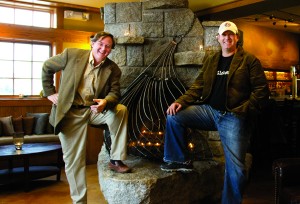With the inception and growth of their Serenitee Restaurant Group, Mark McDonough and Jeff Cala set out to establish a sense of community and social responsibility-and good food-on the North Shore. By Alexandra Pecci
Mark Mcdonough is perched at the edge of a couch at Latitude 43 Restaurant and Bar in Gloucester, excitedly flipping through a binder filled with charts and graphs about the sustainability of Gloucester fishing. Yes, he’s a 70-hour-a-week restaurateur at the helm of Serenitee Restaurant Group. Yes, he has degrees in business, family therapy, and philosophy and religion from MIT, Antioch New England, and Vassar. But the way he expounds passionately about biodiversity and dragger nets makes you think that Gloucester fishing is in his blood.
That’s because to McDonough, restaurants and food aren’t just about feeding people; they’re a culmination of his efforts to make the world-or at least his corner of it-a greener and more community-oriented place.
“People want to share food; they want to go out and play together. Restaurants are not just about food,” he says. “I build restaurants to build community. They’re really a front for community building.”
Although Serenitee Restaurant Group now owns and operates six of the area’s top restaurants, it all started when McDonough, as the financial backer, and Jeff Cala, corporate chef and managing partner, first opened Alchemy in Gloucester in 2003.
“And in year one, we hit year 10 in the spreadsheet. Let’s do that again!” McDonough recalls of Alchemy’s success. They followed up with Cala’s in Manchester-by-the-Sea, which became a destination for fine dining. “And then that restaurant was a hit. Let’s do that again!”
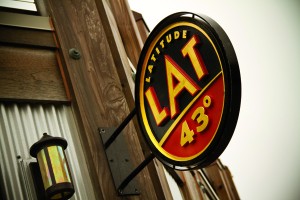 By 2010, McDonough and Cala had indeed done it again and again, opening not only Alchemy and Cala’s, but Hale Street Tavern, Sushi and Oyster Bar in Beverly Farms; Latitude 43 in Gloucester; 15 Walnut in South Hamilton; and most recently, Backstage Bistro at the North Shore Music Theatre in Beverly.
By 2010, McDonough and Cala had indeed done it again and again, opening not only Alchemy and Cala’s, but Hale Street Tavern, Sushi and Oyster Bar in Beverly Farms; Latitude 43 in Gloucester; 15 Walnut in South Hamilton; and most recently, Backstage Bistro at the North Shore Music Theatre in Beverly.
While McDonough-whose careers have ranged from family therapist to web developer-might seem like an unlikely restaurateur, Cala was born for it. He didn’t go to culinary school, but learned the art and trade of restaurants the old-fashioned way, starting out as a dishwasher at the age of 14. “And then when the prep cook didn’t show up, I became a prep cook. And then one day the grill guy didn’t show up, and I became a grill guy,” says Cala, who quit school in 11th grade to head out West “because of the trends.” He bounced around kitchens from California to Florida to South Carolina to New York, learning California spa cuisine, Hawaiian cuisine, and classical cuisine. “I knew what I wanted to do,” he says. “And I learned in the kitchens.”
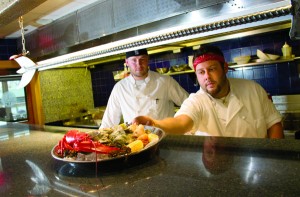 But when the economy tanked, both Cala and McDonough had to relearn what it meant to run a restaurant. As McDonough says, all of their restaurants “failed” because people stopped going out to eat. “We had to reinvent ourselves and our restaurants, fast,” Cala says. “Because nobody was going to Boston for high-end foods, and they sure as hell weren’t going to high-end restaurants on the North Shore.”
But when the economy tanked, both Cala and McDonough had to relearn what it meant to run a restaurant. As McDonough says, all of their restaurants “failed” because people stopped going out to eat. “We had to reinvent ourselves and our restaurants, fast,” Cala says. “Because nobody was going to Boston for high-end foods, and they sure as hell weren’t going to high-end restaurants on the North Shore.”
That’s where the community and sustainability stuff comes in. While economy has suffered over the past few years, other things-like local food sourcing, social networking, and greener, leaner living-have thrived, and restaurants are following suit. Gone are the days of stuffy service, exotic, far-flung ingredients, and the exclusivity of fine dining.
“People are getting more local; they’re using more underutilized products. All of a sudden, cod has had this resurgence,” Cala says. “People are getting more into stuff that’s indigenous to their area.”
So, Serenitee Restaurant Group retooled their restaurants to follow those trends. Alchemy and 15 Walnut are “farm-to-table” restaurants that focus on simple, locally sourced food; the tapas at Alchemy and wide tables at 15 Walnut encourage sharing. Hale Street and Cala’s have become what McDonough calls “Cheers bars,” where everyone knows your name. The reinterpreted comfort foods at these restaurants aren’t “trying to shoot out the lights,” McDonough says. “It’s food you might find at home but done really well.” Latitude 43 and Backstage Bistro provide “food as entertainment.” They’re places where live music and theater are nearly as important as the food.
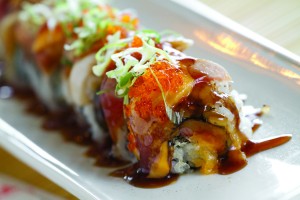 That’s not to say the food’s not important. According to Cala, a lot of their vendors are former chefs or sommeliers who really know their food. Cala keeps up with trends, not just in the United States, but also around the world. They have a commercial fishing license, which allows them to buy right off the docks. And just because food is local and familiar doesn’t mean that it’s boring. “People want it authentic; they want it simple, but they don’t want it made with Hellman’s the way mom did,” McDonough says. “They want aioli.”
That’s not to say the food’s not important. According to Cala, a lot of their vendors are former chefs or sommeliers who really know their food. Cala keeps up with trends, not just in the United States, but also around the world. They have a commercial fishing license, which allows them to buy right off the docks. And just because food is local and familiar doesn’t mean that it’s boring. “People want it authentic; they want it simple, but they don’t want it made with Hellman’s the way mom did,” McDonough says. “They want aioli.”
Cala says he’s constantly encouraging his chefs to push the boundaries and experiment. They put their own spins on traditional clam chowder, adding fennel, onions, and applewood-smoked bacon. Their meatloaf is made with four different kinds of meat, Japanese breadcrumbs, whole-grain mustard, Worcestershire sauce, and horseradish root. Cala likes to mix fruits and root vegetables, work with chilis, and mix flavors like sweet and salty, spicy and savory.
“I try to inspire my chefs,” he says. “I think one of my biggest jobs is to keep my chefs fresh and not stagnant. I think I have to throw a lot of ingredients at these guys and a lot of different theories and ideas.”
Although some people are mourning the death of fine dining, McDonough doesn’t seem to be one of them. “That formality? I don’t know that I want that back,” he says. “I love bigger parties, hanging out. I like that lifestyle.”
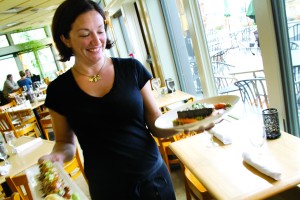 That lifestyle is one that’s based on community and bringing people together, and it’s what McDonough has been trying to achieve for most of his career. In addition to once working as a family therapist, he also built the website and was a major funder for TimeBanks.org, an organization that facilitates a barter economy by encouraging people to do things for others in their community. He’s a co-founder of CapeAnnTimeBanks.org and the Cape Ann Farmers’ Market and is passionate about sustainability. He sees restaurants as yet another way to build community.
That lifestyle is one that’s based on community and bringing people together, and it’s what McDonough has been trying to achieve for most of his career. In addition to once working as a family therapist, he also built the website and was a major funder for TimeBanks.org, an organization that facilitates a barter economy by encouraging people to do things for others in their community. He’s a co-founder of CapeAnnTimeBanks.org and the Cape Ann Farmers’ Market and is passionate about sustainability. He sees restaurants as yet another way to build community.
“I was much more focused on the classical ‘save the world’ stuff. Then I got the message. The thread through all of them was: ‘Get local,'” he says. “Restaurants were a big part of what it means to get local.”
As a result, green and community features are a big part of the restaurants. At Latitude 43, there are green details everywhere you look, from the solar-heated dishwashers to the recycled-glass kitchen tiles. One of the elements of its new tavern, which has been redesigned to double its capacity, is a screen with a continuously running Twitter feed, so people at the bar can send anonymous tweets to each other.
McDonough says 2011 will be the “year of the party,” and every restaurant will throw a party for its regulars every two months, often with a charity involved. Sure it’s all good for business, but McDonough says nothing makes him happier than when two groups of diners take matters into their own hands and push their tables together so they can eat as one big group.
“My biggest success is watching tables come together,” he says. “When they get pushed together, that’s a success.”

